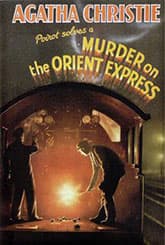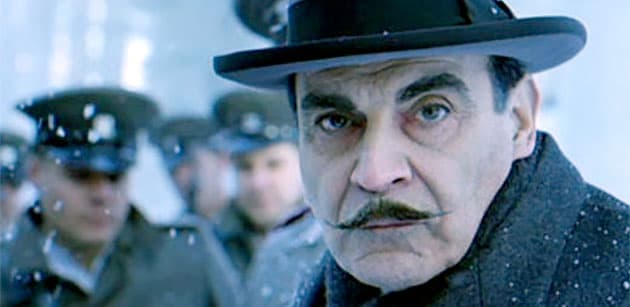Murder on the Orient Express
Critique • Quotes • At the movies
 First edition
First editionAlso known as
Murder in the Calais Coach
First publication
1934
Literature form
Novel
Genres
Crime, mystery
Writing language
English
Author's country
England
Length
Approx. 66,000 words

David Suchet is a morally anguished Hercule Poirot in 2010's Murder on the Orient Express.
Poirot's religious mystery play
Murder on the Orient Express (2010): Television episode, 90 minutes; director Philip Martin; writers Stewart Harcourt; featuring David Suchet, Toby Jones, Eileen Atkins, Jessica Chastain, David Morrissey, Hugh Bonneville, Barbara Hershey
The most interesting adaptation of Murder on the Orient Express may be the 2010 movie made as part of the Agatha Christie's Poirot series on British television—mainly for the darkness and depth the David Suchet-led presentation brings out in the novel.
This production of Murder on the Orient Express may lack the budgets of the big cinematic adaptations, and the more glamorous casts of the 1974 and 2017 movies. But those elements are not necessary to produce meaningful, moving drama, this one shows.
It helps that it is led by the best Hercule Poirot ever. In the role previously inhabited by such great actors as Peter Ustinov and Albert Finney, and later Kenneth Branagh and John Malkovich, Suchet comes closest—by a long shot—to the detective in the books.
In fact, you could argue he deepens and raises the character beyond Christie's expectations without violating her original vision. The author came to find her most famous creation insufferable, but I have the feeling she would appreciate the man who arises from Suchet's portrayal.
His version of Murder on the Orient Express is framed as a morality play, bringing the moral dilemmas of the novel perhaps to greater prominence than Christie intended but to good effect.
Uncomfortable Poirot
The film begins as Poirot recalls with obvious qualms his previous case, which concluded with the suicide of the perpetrator he had uncovered. And it ends with his anguish over the conclusion of this latest mystery.
Along the way, issues of justice and personal responsibility are raised, some based on the text and some brought out by the film. An adulterous woman is attacked in the streets of Istanbul as Poirot and other Westerners witness without intervening. An uncomfortable Poirot acquiesces in being given another passenger's first-class berth on the Orient Express. Various other scenes and discussions on weighing the need to follow society's rules versus the dictates of conscience—which, as it turns out, is something every passenger on the train has wrestled with.
Appropriately this Murder on the Orient Express is darkly lit, with shadows shuddering across faces engulfing them entirely as the train rattles into the night and comes to its fateful halt in the snow. Poirot's face bears a continual frown, as his demeanor is darker in this film than in Suchet's many previous depictions of the detective.
He is also shown praying and trying to be a good Catholic, the only time I can recall Poirot ever displaying religious feeling. This may sound like a needless addition, but it deepens the character—who is usually portrayed as a bit of a pretentious buffoon. And it fits in well with this adaptation's atmospheric take on the mystery.
Trailer for 2010's dark and moving television movie of Murder on the Orient Express.
Without being the silver-screen stars of other productions of Murder on the Orient Express, the rest of the cast are top-notch, mainly British actors, from Toby Jones as the ill-fated gangster on down. Their jobs are more than appearing for cameos and and passing before Poirot as suspects. They actually have to act. Especially effective is American actress Jessica Chastain as the governess.
Their interaction is shown throughout the film but culminates near the end, as Poirot closes in on the murder's solution. At one point Poirot has angrily excoriated the culprits and they have to decide among themselves what to do, at the same time as Poirot is questioning his own decision.
The tension builds up inexorably to the finale.
Most Agatha Christie works—between covers and on screens—end on light, optimistic notes. The last few scenes in this adaptation present the most moving ending ever filmed for a Christie production, a powerful mix of relief and despair, and the continuing mystery of whether humanity can ever really know what is right or wrong.
— Eric

